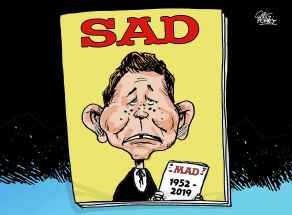Property insurance tax cut minor move toward major destination
Read this article for free:
or
Already have an account? Log in here »
To continue reading, please subscribe:
Monthly Digital Subscription
$0 for the first 4 weeks*
- Enjoy unlimited reading on winnipegfreepress.com
- Read the E-Edition, our digital replica newspaper
- Access News Break, our award-winning app
- Play interactive puzzles
*No charge for 4 weeks then price increases to the regular rate of $19.00 plus GST every four weeks. Offer available to new and qualified returning subscribers only. Cancel any time.
Monthly Digital Subscription
$4.75/week*
- Enjoy unlimited reading on winnipegfreepress.com
- Read the E-Edition, our digital replica newspaper
- Access News Break, our award-winning app
- Play interactive puzzles
*Billed as $19 plus GST every four weeks. Cancel any time.
To continue reading, please subscribe:
Add Free Press access to your Brandon Sun subscription for only an additional
$1 for the first 4 weeks*
*Your next subscription payment will increase by $1.00 and you will be charged $16.99 plus GST for four weeks. After four weeks, your payment will increase to $23.99 plus GST every four weeks.
Read unlimited articles for free today:
or
Already have an account? Log in here »
Hey there, time traveller!
This article was published 11/07/2019 (2347 days ago), so information in it may no longer be current.
The Manitoba Tory pledge to eliminate the PST from home insurance premiums isn’t so much a proposed tax cut as it is a reversal of bad policy made by the previous NDP government.
Premier Brian Pallister announced Monday — if his government is re-elected Sept. 10 — the provincial sales tax would no longer apply to property insurance, including rental units. The Tories estimate it will save the average household $70 a year.
On its own, $70 over 12 months doesn’t amount to much. Although for people living paycheque to paycheque, every little bit counts.
What’s more important, though, is the broader move to reduce Manitobans’ overall tax burden.
Manitoba faces an uphill battle to improve its economic competitiveness. And tackling the province’s high taxes is an important part of any effective strategy to better attract (and retain) skilled workers, and to make it a more attractive place to do business.
The fact Manitobans pay among the highest taxes in Canada isn’t just an empty buzzword thrown around by politicians and interest group leaders: it’s a reality that constrains Manitoba’s economic potential.
Manitobans earning $30,000 a year, for example, pay $2,227 in provincial income taxes, the highest of any province. (It is $992 in Ontario at that income level and $1,463 in Saskatchewan.)
At $60,000 a year, Manitobans pay the highest income taxes west of Quebec, and nearly double that of Ontario.

!function(e,t,s,i){var n=”InfogramEmbeds”,o=e.getElementsByTagName(“script”)[0],d=/^http:/.test(e.location)?”http:”:”https:”;if(/^/{2}/.test(i)&&(i=d+i),window[n]&&window[n].initialized)window[n].process&&window[n].process();else if(!e.getElementById(s)){var r=e.createElement(“script”);r.async=1,r.id=s,r.src=i,o.parentNode.insertBefore(r,o)}}(document,0,”infogram-async”,”https://e.infogram.com/js/dist/embed-loader-min.js”);
The previous NDP government added to the burden by expanding the PST three times from 2002 to 2012, and raising the rate in 2013.
In 2002, the PST was expanded to include mechanical and electrical services, such as plumbers and electricians. In 2004, it was broadened to include legal, accounting, architectural, engineering, security and private investigation services.
In 2012, the province added it to a wide range of insurance premiums, including home insurance, group life insurance, and trip cancellation insurance. Salon services (such as pedicures and manicures, facials, and haircuts over $50), as well as tattoos and piercings, also became taxable that year.
The impact of those expansions was compounded when then-premier Greg Selinger raised the PST to eight per cent (from seven) in 2013, a move he paid the ultimate political price for.
The provincial government has to start the process of reducing Manitobans’ tax burden at some point. It has to be done gradually, but it must be done.
It was a revenue boon for the provincial government, but it made Manitoba less competitive and further eroded taxpayers’ disposable income.
No doubt Pallister will be criticized for reducing taxes while still running a deficit. It’s a valid criticism.
Why not balance the books first?
They could, but if making some early moves now to reduce taxes doesn’t impact the long-term schedule of eliminating the deficit, it’s a win-win.

It really doesn’t matter if the province balances the books in two years or four years, as long as there’s a realistic plan to get there. And so far, none of the tax rollbacks have affected that schedule.
Pallister has also been criticized for targeting home insurance as his first campaign-style announcement, given the controversy over his government’s involvement in the dispute between Manitoba Public Insurance and provincial insurance brokers. He likely would have been criticized for that no matter when he made the pledge — and one really has nothing to do with the other.
The provincial government has to start the process of reducing Manitobans’ tax burden at some point. It has to be done gradually, but it must be done.
Rolling back the PST to seven per cent was a good first move, and it’s already been factored into this year’s budget. Even with the rate cut, the budget is projected to be balanced by 2023, and the province didn’t have to trim spending to achieve the tax relief. (Overall spending is up slightly for 2019-20, at 0.3 per cent.)
Eliminating the PST on home insurance is a minor rollback, but it is expected to be part of a number of tax-cut announcements in the weeks leading up to the election.
Hopefully, that will also include proposed income-tax relief — at least down the road, once the province is in the black. Because that’s where Manitoba is the least competitive — and where Manitobans would benefit the most.
tom.brodbeck@freepress.mb.ca

Tom has been covering Manitoba politics since the early 1990s and joined the Winnipeg Free Press news team in 2019.
Our newsroom depends on a growing audience of readers to power our journalism. If you are not a paid reader, please consider becoming a subscriber.
Our newsroom depends on its audience of readers to power our journalism. Thank you for your support.










